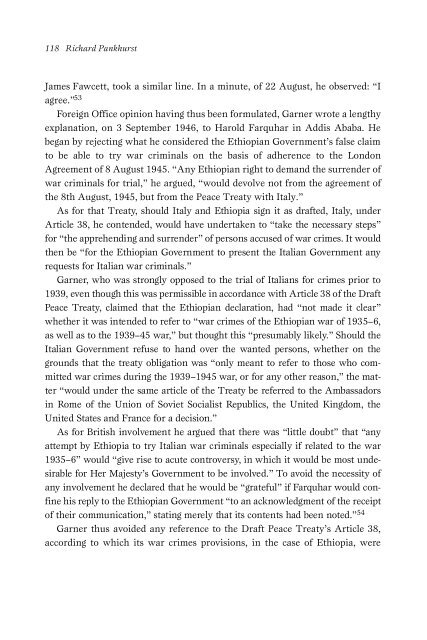Italian Fascist War Crimes in Ethiopia - Societa italiana di storia ...
Italian Fascist War Crimes in Ethiopia - Societa italiana di storia ...
Italian Fascist War Crimes in Ethiopia - Societa italiana di storia ...
You also want an ePaper? Increase the reach of your titles
YUMPU automatically turns print PDFs into web optimized ePapers that Google loves.
118 Richard Pankhurst<br />
James Fawcett, took a similar l<strong>in</strong>e. In a m<strong>in</strong>ute, of 22 August, he observed: “I<br />
agree.” 53<br />
Foreign Office op<strong>in</strong>ion hav<strong>in</strong>g thus been formulated, Garner wrote a lengthy<br />
explanation, on 3 September 1946, to Harold Farquhar <strong>in</strong> Ad<strong>di</strong>s Ababa. He<br />
began by reject<strong>in</strong>g what he considered the <strong>Ethiopia</strong>n Government’s false claim<br />
to be able to try war crim<strong>in</strong>als on the basis of adherence to the London<br />
Agreement of 8 August 1945. “Any <strong>Ethiopia</strong>n right to demand the surrender of<br />
war crim<strong>in</strong>als for trial,” he argued, “would devolve not from the agreement of<br />
the 8th August, 1945, but from the Peace Treaty with Italy.”<br />
As for that Tre a t y, should Italy and <strong>Ethiopia</strong> sign it as drafted, Italy, under<br />
Article 38, he contended, would have undertaken to “take the necessary steps”<br />
for “the apprehend<strong>in</strong>g and surrender” of persons accused of war crimes. It wo u l d<br />
then be “for the <strong>Ethiopia</strong>n Government to present the <strong>Italian</strong> Government any<br />
requests for <strong>Italian</strong> war crim<strong>in</strong>als.”<br />
G a r n e r, who was strongly opposed to the trial of <strong>Italian</strong>s for crimes prior to<br />
1939, even though this was permissible <strong>in</strong> accordance with Article 38 of the Dra f t<br />
Peace Tre a t y, claimed that the <strong>Ethiopia</strong>n declaration, had “not made it clear”<br />
whether it was <strong>in</strong>tended to refer to “war crimes of the <strong>Ethiopia</strong>n war of 1935–6,<br />
as well as to the 1939–45 wa r,” but thought this “presumably like l y.” Should the<br />
<strong>Italian</strong> Government refuse to hand over the wanted persons, whether on the<br />
g rounds that the treaty obligation was “only meant to refer to those who committed<br />
war crimes dur<strong>in</strong>g the 1939–1945 wa r, or for any other reason,” the matter<br />
“would under the same article of the Treaty be re f e r red to the Ambassadors<br />
<strong>in</strong> Rome of the Union of Soviet Socialist Republics, the United K<strong>in</strong>gdom, the<br />
United States and France for a decision.”<br />
As for British <strong>in</strong>vo l vement he argued that there was “little doubt” that “a ny<br />
attempt by <strong>Ethiopia</strong> to try <strong>Italian</strong> war crim<strong>in</strong>als especially if related to the wa r<br />
1935–6” would “give rise to acute controve r s y, <strong>in</strong> which it would be most undes<br />
i rable for Her Majesty’s Government to be <strong>in</strong>vo l ved.” To avoid the necessity of<br />
a ny <strong>in</strong>vo l vement he declared that he would be “grateful” if Fa rquhar would conf<strong>in</strong>e<br />
his reply to the <strong>Ethiopia</strong>n Government “to an acknowledgment of the re c e i p t<br />
of their communication,” stat<strong>in</strong>g merely that its contents had been noted.” 5 4<br />
Garner thus avoided any reference to the Draft Peace Treaty’s Article 38,<br />
accord<strong>in</strong>g to which its war crimes provisions, <strong>in</strong> the case of <strong>Ethiopia</strong>, were

















